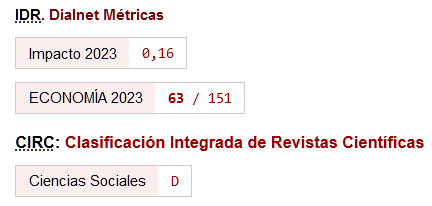Acumulación por desposesión, género y crisis en el estado español
Keywords:
gender, crisis, primitive accumulation, accumulation by disposession, social reproduction, SpainAbstract
In this paper I examine how the current economic crisis in Spain, as well as the ways in which the State manages it, are shaped by gender. In order to achieve my goal, I adopt the concept of primitive accumulation or accumulation by dispossession as my main analytical axis. I suggest that, far from being a merely foundational process, with the complicity of the State, primitive accumulation appears continuosly throughout the crises of capitalism as a mechanism for overcoming them. It is also a process fundamentally marked by gender. The increase of women’s total work load, as well as the intensification of their reproductive responsibilities, are not simply collateral effects of the current crisis but rather result from a political-economic strategy of privatization and re-housewification of reproduction in the aim of saving the so called real economy. We are thus before a new enclosure of the commons which adopts the form of an updated strengthening of the sexual division of labor within the household. This does not result in women’s exit from the so called productive economy but rather in their increased presence in it.
Downloads
References
Alarcón, Gloria; Arias, Carolina & Colino, José (2011): "Infraestructuras y género, análisis del FEIL-2009: población municipal y CCAA", Investigaciones Feministas, vol. 2, pp. 151-174.
https://doi.org/10.5209/rev_INFE.2011.v2.38609
Bakker, Isabella (2010): "Neoliberal Governance and Social Reproduction", Conferencia Gender, Political Economy, and Human Security. York University, Toronto, Canadá. 5 de octubre de 2010.
Bedford, Kate & Rai, Shirin, M. (2010): "Feminists Theorize International Political Economy", Signs: Journal of women in Culture and Society, vol. 36, Nº 1, pp. 1-18. https://doi.org/10.1086/652910
Benería, Lourdes (2003): "Economic Rationality and Globalization: A Feminist Perspective", en Ferber, M. & Nelson, J. (eds.) Feminist Economics Today. Beyond Economic Man, Chicago, The University of Chicago Press.
Blair, Jennifer (2010): "On Difference and Capital: Gender and the Globalization of Production", Signs: Journal of Women in Culture and Society, vol. 36, Nº 1, pp. 203-226. https://doi.org/10.1086/652912
Brown, Wendy (2006): "American Nightmare: Neoliberalism, Neoconservatism, and De-Democratization", Political Theory, Nº 34, pp. 690-714. https://doi.org/10.1177/0090591706293016
Cruikshank, Barbara (1999): The Will to Empower: Democratic Citizens and Other Subjects, Ithaca: Cornell University Press. https://doi.org/10.7591/9781501733918
Durán, María Ángeles (2011): El trabajo no remunerado en la economía global, Madrid: Fundación BBVA.
Ezquerra, Sandra (2005): "Plan Puebla Panamá: A Case of Globalization Against the Environment" presentada en The Pacific Sociological Association Conference, Portland, Oregon (Estados Unidos).
Ezquerra, Sandra (2010): "La crisis de los cuidados: orígenes, falsas soluciones y posibles oportunidades", Viento Sur, Nº 108, pp. 37-43.
Ezquerra, Sandra (2011a): "Crisis desiguales: miradas feministas a los efectos de la crisis", Viento Sur, Nº 114, pp. 91-98.
Ezquerra, Sandra (2011b): "Women's Crises: Spanish economic recession and political responses from a feminist perspective" en Onaran & Leplat (eds.) Capitalism and crisis, Londres: International Institute for Research and Education.
Ezquerra, Sandra (2011c): "Crisis de los cuidados y crisis sistémica: la reproducción como pilar de la economía llamada real", Investigaciones Feministas, vol. 2, pp. 175-187. https://doi.org/10.5209/rev_INFE.2011.v2.38610
Ezquerra, Sandra (2012): "Sobre viejas y nuevas gestiones de la crisis o el retorno de las mujeres al hogar", Viento Sur, Nº 121, pp. 87-95.
Federici, Silvia (2010) [2004]: Calibán y la bruja. Mujeres, cuerpo y acumulación originaria, Madrid: Traficantes de Sueños.
Federici, Silvia & Fortunati, Leopoldina (1984): Il Grande Calibano. Storia del corpo social ribelle nella prima fase del capitale, Milán: Franco Agneli.
Ferber, Marianne & Nelson, Julie (2003): Feminist Economics Today. Beyond Economic Man, Chicago: The University of Chicago Press. https://doi.org/10.7208/chicago/9780226775166.001.0001
Gálvez, Lina & Torres, Juan (2009): "La crisis económica y sus alternativas: una perspectiva de género", Fórum de Política Feminista, pp. 15-30, http://www.forumpoliticafeminista.org/fotos/files/1.pdf.
Gálvez, Lina & Matus, Mauricio (2010): Impacto de la Ley de Igualdad y la conciliación de la vida laboral, familiar y personal en las empresas andaluzas. Sevilla: Secretaría de la Mujer de CCOO Andalucía-Fundación de Estudios Sindicales.
Gálvez, Lina & Torres, Juan (2010): Desiguales. Mujeres y hombres en la crisis financiera, Barcelona: Icaria.
Gálvez, Lina & Rodríguez, Paula (2011): "La desigualdad de género en las crisis económicas", Investigaciones Feministas, vol. 2, pp. 113-132.
Girón, Alicia (2011): "Género, crisis económica y fragilidad financiera: desenredando la madeja", Investigaciones Feministas, vol. 2, pp. 11-28. https://doi.org/10.5209/rev_INFE.2011.v2.38602
Gobierno de España (2008): Plan español para el estímulo de la economía y el empleo. Disponible en http://www.meh.es/Documentacion/Publico/PortalVarios/Gesti%C3%B3n%20del%20Portal/Plan%20estimulo%20econom%C3%ADa%20y%20empleo.pdf.
Harcourt, Wendy (2009): "El impacto de la crisis en las mujeres de Europa Occidental". http://www.awid.org/eng/About-AWID/AWID-News/Briefs-The-Impact-of-the-crisis-on-Women.
Hartsock, Nancy (2006): "Globalization and Primitive Accumulation: The Contributions of David Harvey's Dialectical Marxism", en Noel Castree & Derek Gregory (eds.) David Harvey: A Critical Reader, Nueva York: Blackwell. https://doi.org/10.1002/9780470773581.ch9
Hartsock, Nancy (2011): "A New Moment of Primitive Accumulation". Conferencia Inaugural de la Conferencia Inkrit.
Harvey, David (2003): The New Imperialism, Oxford: Oxford University Press.
https://doi.org/10.1093/oso/9780199264315.001.0001
Harvey, David (2004): "The 'New' Imperialism: Accumulation by Dispossession", Socialist Register, vol. 40, http://socialistregister.com/.
Izquierdo, María Jesús (2003): "Del sexismo y la mercantilización del cuidado a su socialización: Hacia una política democrática del cuidado", en Congreso Internacional SARE Cuidar cuesta: costes y beneficios del cuidado, Donostia, Emakunde-Instituto Vasco de la Mujer y Comunidad Europea/Foro Social Europeo.
Jefferson, Therese (2009): "Women and Retirement Pensions: A Research Overview", Feminist Economics, Nº 15, vol. 4, pp. 115-145. https://doi.org/10.1080/13545700903153963
Katz, Cindi (2006): "Messing with 'the Project'" en Noel Castree & Derek Gregory (eds.) David Harvey: A Critical Reader, Nueva York: Blackwell. https://doi.org/10.1002/9780470773581.ch12
Keating, Christine; Rasmussen, Claire & Rishi, Pooja (2010): "The Rationality of Empowerment: Microcredit, Accumulation by Dispossession, and the Gendered Economy", Signs: Journal of Women in Culture and Society, vol. 36, Nº 1, pp. 153-176. https://doi.org/10.1086/652911
Lahey, Kathleen (2011): "At the Intersection of Global Economics Crisis and State Anti-Feminism: Women in Canada, 2008-2009", Investigaciones Feministas, vol. 2, pp. 55-70.
Larrañaga, Mertxe (2009): "Mujeres, tiempos, crisis: Combinaciones variadas". Revista de Economía Crítica, Nº 8, pp. 113-120.
Larrañaga, Mertxe; Jubeto, Yolanda & De la Cal, Mª Luz (2011): "Tiempos de crisis, tiempos de des-ajustes, tiempos precarios, tiempos de mujeres", Investigaciones Feministas, vol. 2, pp. 95-111.
https://doi.org/10.5209/rev_INFE.2011.v2.38606
LeBaron, Genevieve & Roberts, Adrienne (2010): "Toward a Feminist Political Economy of Capitalism and Carcerality", Signs: Journal of Women in Culture and Society, vol. 36, Nº 1, pp. 19-44. https://doi.org/10.1086/652915
Luxemburgo, Rosa (1956) [1913]: The Accumulation of Capital, Nueva York: Monthly Review Press.
Marchand, Marianne & Runyan, Anne (2000): Gender and Global Restructuring. Sightings, Sites and Resistances, Londres: Routledge.
Marx, Karl (2007) [1867]: El capital. Libro I, Madrid: Akal.
Mies, María (1987): Patriarchy and Accumulation on a World Scale. Women in the International Division of Labor, Londres: Zed Books.
OCDE (2011): Society at a Glance 2011 - OECD Social Indicators, http://www.oecd.org/els/social/indicators/SAG.
Otxoa, Isabel (2009): "Anticapitalismo: algunas razones desde el feminismo". Viento Sur, Nº 104, pp. 66-73.
Pérez Orozco, Amaia (2011): "Crisis multidimensional y sostenibilidad de la vida", Investigaciones Feministas, vol. 2, pp. 29-53. https://doi.org/10.5209/rev_INFE.2011.v2.38603
Safri, Maliha & Graham, Julie (2010): "The Global Household: Toward a Feminist Postcapitalist International Political Economy", Signs: Journal of Women in Culture and Society, vol. 36, Nº 1, pp. 99-125. https://doi.org/10.1086/652913
Sales, Laura (2009): Informe de Recerca. Dones en crisi, Barcelona: Institut Català de les Dones.
Salzinger, Leslie (2003): Genders in Production, Berkeley: UC Press. https://doi.org/10.1525/9780520929302
Takhtamanova, Yelena & Sierminska, Eva (2009): "Gender, Monetary Policy: The Case of Nine OECD Countries", Feminist Economics, Nº 15, vol. 3, pp. 323-353. https://doi.org/10.1080/13545700902893122
Downloads
Published
How to Cite
Issue
Section
License
This licence allows third parties to share (copy and redistribute the material in any medium or format) and adapt (remix, transform and create from the material for any purpose, including commercial purposes), provided that authorship and first publication in this journal (The Journal, DOI of the work) is acknowledged, a link to the licence is provided, and it is stated whether changes have been made to the work.







